This post is part of our special coverage Russia's Protest Movement.
In 35 days, the Russian protest movement will jettison its most spectacular and schismatic trait: its spontaneity. On October 20, the new “Central Elections Committee” headed by Leonid Volkov will hold two-day elections to select forty-five individuals to form the first “Coordinating Council of the Russian Opposition.” When this process is complete, the protest movement will have a representative body for the first time, providing a powerful, if somewhat controversial, institution that at last formalizes opposition leaders’ legitimacy in Russian politics.
Today marks the deadline [ru] for candidate-registration, though Volkov has indicated [ru] that the Committee is working through a backlog that might add another fifty people to the current total. At any rate, we can now study the list of candidates [ru] and begin to draw some conclusions about the group's makeup, as well as forecast who is likeliest to win a seat in the Council.
The design
First, let's briefly review the structure of the election, so we can understand what is at stake. Voting is planned to take place both online and at physical ballot installations across Russia. (Commentators usually describe it as an online election, probably because the bulk of participation is expected to occur through the Internet.) At this moment, 142 individuals have registered for a total of 45 Council seats. Not all candidates are in direct competition, however.
The Coordinating Council has four internal divisions: General Civil, Leftist, Liberal, and Nationalist. The first wing holds thirty seats, and the “ideological courts” hold another five each. 116 people are currently registered in the General Civil category; 6 are registered for the Leftists; 11 for the Liberals; and 9 for the Nationalists. Put another way, each General Civil candidate has a 26% chance of victory, each Leftist an 83% chance; each Liberal a 45% chance; and each Nationalist a 56% chance. (Until earlier today, there were actually only five Leftist candidates registered in total, meaning that they were effectively running unopposed.)
Oddities and curiosities
Before moving onto our core quantitative analysis, it's worth highlighting a few anomalies in the registration results. The most obvious inconsistency is that only Nationalists appear to have registered their highest profile representatives in the “ideological” category. Konstantin Krylov, Vladimir Tor, and Aleksandr Belov are a few of the biggest names in Russian nationalism, and you'll find them all competing for Nationalist seats on the Coordinating Council.
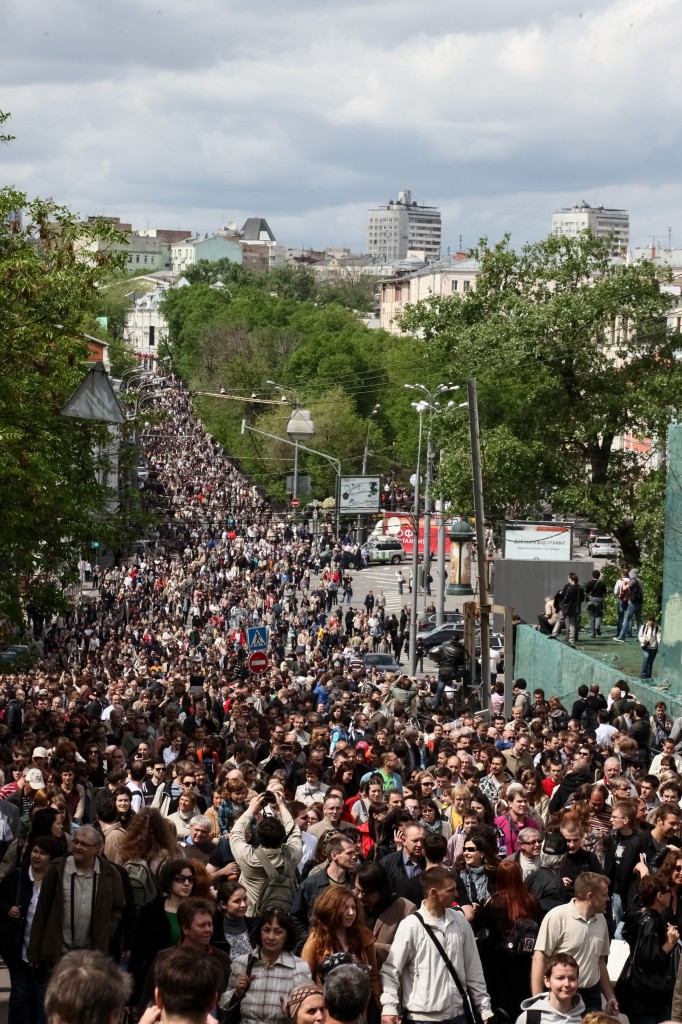
Writers and novelists lead unsanctioned march in Moscow. May 13, 2012, by Maria Pleshkova, copyright © Demotix.
The Liberal field is only slightly more competitive, but the creed's best known figures are largely absent. Alexey Navalny, Ilya Yashin, Boris Nemtsov, and others are all listed in the General Civil race. The most surprising registration belongs to Sergei Udaltsov, a radical Stalinist, who dodged the Leftist category and also registered to compete for a General Civil seat. The same is true of leftists Oleg Shein, Anastasia Khrustalnaia, and others.
Given the registration patterns, candidates must realize the relative ease of winning an ideological seat. If that can be assumed, it seems that most high-profile oppositionists (other than the nationalists) have consciously opted for the tougher competition in the General Civil category. The reasons for this are likely twofold: (1) winning a seat in the more competitive race bestows greater legitimacy, and (2) there is a general stigma to the ideological wings that ambitious “uniters” have tried to avoid. (Navalny, for example, condemned [ru] separate ideological columns in the February march at Bolotnaia Square, earlier this year.)
It is also worth noting that the candidates are overwhelmingly male. In fact, just 13% of the people running for seats in the Council are women. Among the ideological wings, that figure drops to 8%. (All nine of the registered Nationalists are men.) While there has always been a gender imbalance in the protest movement, the Council's candidates represent a new level of disparity. In February 2012, for instance, the Levada Center determined [ru] that women made up at least 35-40% of last winter's street demonstrations.
Putting it to the test
Many of the people commonly considered to be leaders of the protest movement are extremely popular bloggers. Most of these netizens write on LiveJournal, though there is an increasing use of Twitter and Facebook. Observers have long asked the question: can blogging translate into genuine political prominence?
The coming Coordinating Council election presents a unique opportunity to test that concept.
To that end, Global Voices has compiled a list of all persons currently registered for the election and ranked them according to “blog authority.” The ranking metric we used belongs to Yandex, which describes its methodology as follows [ru]:
Рейтинг блогов рунета — это способ узнать о самых популярных и авторитетных блоггерах русскоязычной блогосферы. Рейтинг составлен на основе авторитетности – интегрального показателя, основанного на данных о том, как часто другие блоггеры ссылаются на рассматриваемый блог, кто именно ссылается, с учётом количества комментариев в блоге, количества известных нам читателей блога, а также других данных о блоге и его положении в блогосфере.
RuNet Blog Ratings is a tool to discover the most popular and authoritative bloggers of the Russian-language blogosphere. The rating is based on authoritativeness: an aggregated measure of data reflecting how often other bloggers link to the blog in question, and who exactly is doing the linking, in addition to the number of comments a blog receives, the number of readers we can identify, and other information about the blog and its stature in the blogosphere.
Before reviewing our findings, it is important to note that Yandex apparently fails to index Facebook in its ratings, meaning that certain candidates appear to be virtual unknowns, though they might actually have many subscribers on the world's largest social network. The individual who certainly falls into this loophole is Olga Romanova, who is extremely active [ru] on Facebook and is probably a shoe-in to win a seat in the Coordinating Council. (In the last year, Romanova has also played a crucial role in the opposition's fundraising efforts.)
That said, our research is still instructive. Having reviewed all the candidates, we believe that the absence of Facebook indexing is a noteworthy but not catastrophic shortcoming of our data.
What follows are the results of our study:

General Civil Category
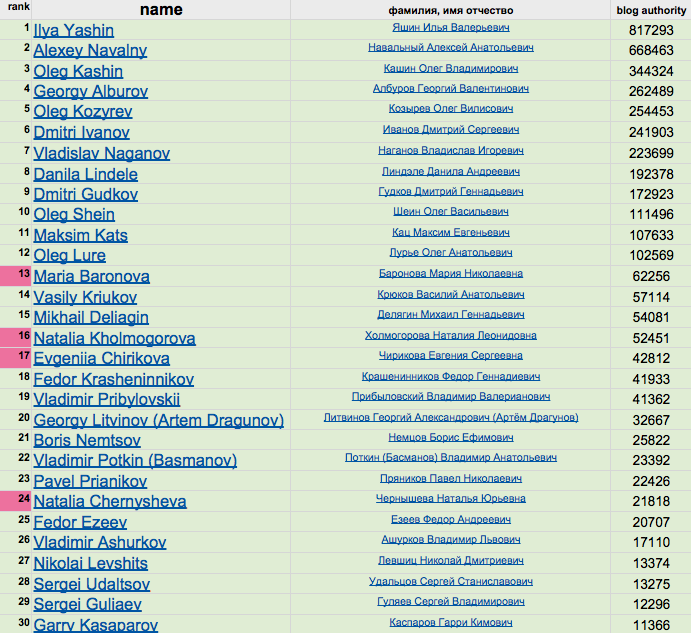
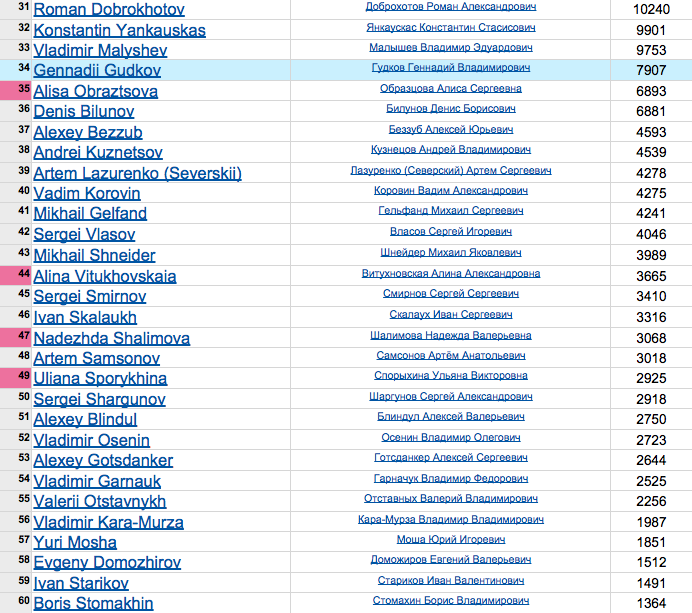
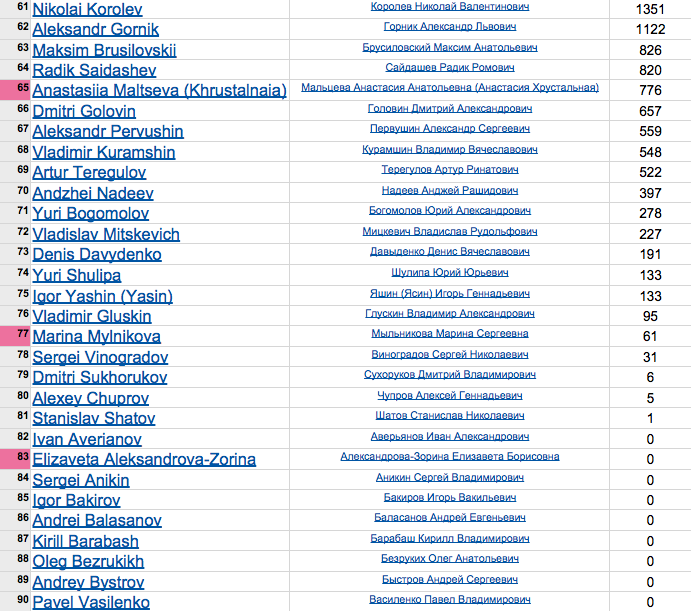
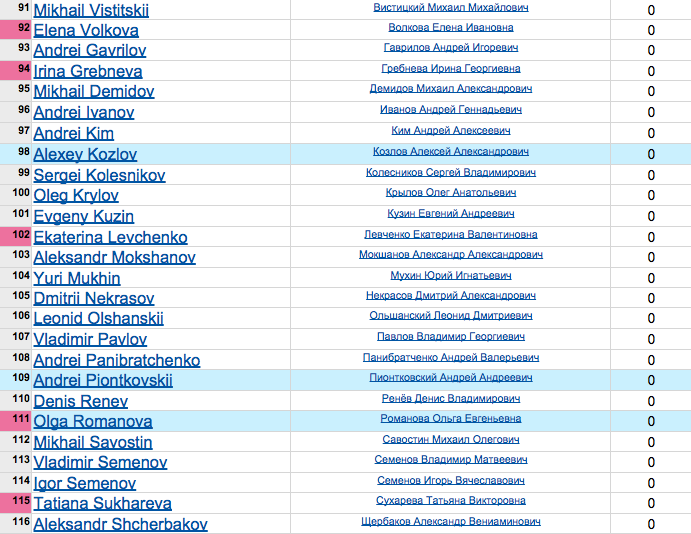
Leftist Category

Liberal Category
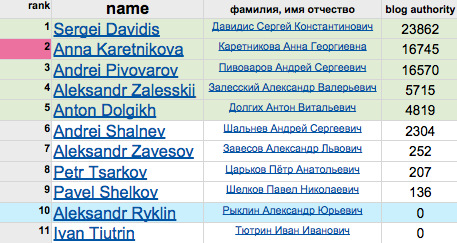
Nationalist Category
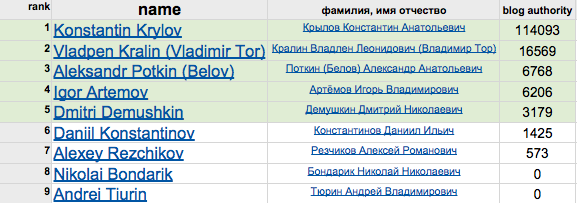
This post is part of our special coverage Russia's Protest Movement.








3 comments
Asking this strictly as a distant observer, how likely is a leftist/nationalist alliance? It sounds nonsensical in a Western context, but does the “Россия для русских” crowd even care about economic details beyond keeping people fed? Likewise, why would the far left hesitate to scapegoat foreign migrant workers, minorities, NATO, etc. given the sheer popularity of those attitudes? The opposition seems to be tearing itself apart not along a Western-style conservative/liberal axis but rather along a straight liberal/authoritarian axis, with liberals doomed to be marginalized by a combination of personal infighting and, frankly, their sheer unpopularity outside of a small urban middle class in the two big cities.
It’s hard to measure the marginalization of the liberals, when they seem to be the best united (as these Coordinating Council elections demonstrate).
One thing I’ll say about the nationalists is that they are fond of couching their rhetoric in terms of budgetary imbalances. For instance, the Хватит кормить Кавказ movement is not at all shy about employing “economic details,” arguing that the republics of the North Caucasus gobble up more than their fair share of federal spending.
Historically, Russian leftists have generally eschewed ethnic scapegoating. I’m sure you could find more than a few exceptions to that trend, but racism doesn’t really serve the leftist fascination with “relationships to the modes of production.” That might be a gross simplification, but I do think there are fundamental contradictions between leftist and nationalist ideologies.
Judging by the nationalists’ own rhetoric, they seem to believe that the liberals are their natural allies. Navalny is of course the most prominent “liberal nationalist” (or “nationalist liberal,” depending on how you slice it). Leftists might think the same thing, if only because the nationalists are even less compatible allies.